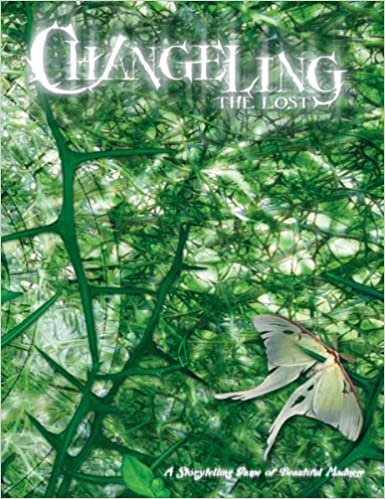I started to feel that I didn’t know roleplaying games well enough so I came up with the plan to read a roleplaying game corebook for every year they have been published. Selection criteria is whatever I find interesting.

I remember when I was the editor of the Finnish roleplaying magazine Roolipelaaja, I assigned someone else to review Changeling: the Lost. Now, only 13 years later, I’ve read it myself too.
Changeling: the Lost belongs to a rather unusual phase in the development of the World of Darkness family of games. The highly successful original games were all rebooted into a new World of Darkness, new but still pretty similar to the original. Culturally, there was a lot of this going around in the 2000’s, with Marvel creating the Ultimate series of comic books and D&D being revamped with the third edition.
With D&D and World of Darkness both, the new versions systematized and harmonized a lot of the structural elements of their respective games, hammering down weirdness and placing a premium on cohesion.
Since then, the original Nineties World of Darkness games have been revitalized. I worked on Vampire: the Masquerade 5th Edition. The games created in the revisions of the early 2000’s have been rebranded as the Chronicles of Darkness line and many have new editions.
The original faerie game was called Changeling: the Dreaming. Changeling: the Lost is the revamp with a significantly adjusted core concept. In The Lost, the faerie are alien and terrifying beings who abduct humans for their own amusement. Some of these humans manage to escape, forever changed by their ordeal.
The player characters are these changelings. They seek to navigate a difficult return to their old lives, the depredations of the faerie and the politics of the changeling community. There are further complications such as the fetches, copies that take the place of abducted humans. It’s awkward to return from Arcadia only to find a copy of yourself living with your family.
Changeling: the Lost has pretty cool, complex setting design. It takes a while to grasp all of it but it provides a very rich social environment full of things that the characters might want to do. The design eschews the kind of folklore-based fae concepts found in Changeling: the Dreaming, such as sidhe or pooka, choosing more generic ones such as Beasts or Darklings.
At the end of the book there’s a category of in-game organizations called Entitlements than can be joined by player characters. One example is Sacred Band of the Golden Standard, warriors who put a premium on being seen to do glorious things. What’s the point of doing good if nobody knows? Many of the Entitlements are clever and original and it’s immediately obvious how they could be used in a game in an interesting way.
Changeling: the Lost doesn’t feel like an update of Changeling: the Dreaming. Rather, it’s a separate game with a new theme that just shares some branding and language with its predecessor.